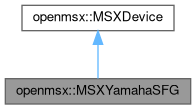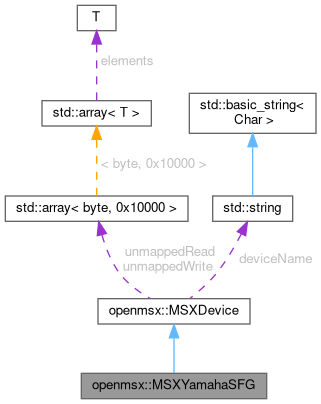#include <MSXYamahaSFG.hh>


Public Member Functions | |
| MSXYamahaSFG (const DeviceConfig &config) | |
| void | reset (EmuTime::param time) override |
| This method is called on reset. | |
| byte | readMem (word address, EmuTime::param time) override |
| Read a byte from a location at a certain time from this device. | |
| byte | peekMem (word address, EmuTime::param time) const override |
| Read a byte from a given memory location. | |
| const byte * | getReadCacheLine (word start) const override |
| Test that the memory in the interval [start, start + CacheLine::SIZE) is cacheable for reading. | |
| void | writeMem (word address, byte value, EmuTime::param time) override |
| Write a given byte to a given location at a certain time to this device. | |
| byte * | getWriteCacheLine (word start) override |
| Test that the memory in the interval [start, start + CacheLine::SIZE) is cacheable for writing. | |
| byte | readIRQVector () override |
| Gets IRQ vector used in IM2. | |
| template<typename Archive > | |
| void | serialize (Archive &ar, unsigned version) |
 Public Member Functions inherited from openmsx::MSXDevice Public Member Functions inherited from openmsx::MSXDevice | |
| MSXDevice (const MSXDevice &)=delete | |
| MSXDevice (MSXDevice &&)=delete | |
| MSXDevice & | operator= (const MSXDevice &)=delete |
| MSXDevice & | operator= (MSXDevice &&)=delete |
| virtual | ~MSXDevice ()=0 |
| const HardwareConfig & | getHardwareConfig () const |
| Returns the hardwareconfig this device belongs to. | |
| void | testRemove (std::span< const std::unique_ptr< MSXDevice > > removed) const |
| Checks whether this device can be removed (no other device has a reference to it). | |
| virtual void | powerDown (EmuTime::param time) |
| This method is called when MSX is powered down. | |
| virtual void | powerUp (EmuTime::param time) |
| This method is called when MSX is powered up. | |
| virtual const std::string & | getName () const |
| Returns a human-readable name for this device. | |
| virtual void | getNameList (TclObject &result) const |
| Returns list of name(s) of this device. | |
| void | getDeviceInfo (TclObject &result) const |
| Get device info. | |
| void | getVisibleMemRegion (unsigned &base, unsigned &size) const |
| Returns the range where this device is visible in memory. | |
| virtual byte | readIO (word port, EmuTime::param time) |
| Read a byte from an IO port at a certain time from this device. | |
| virtual void | writeIO (word port, byte value, EmuTime::param time) |
| Write a byte to a given IO port at a certain time to this device. | |
| virtual byte | peekIO (word port, EmuTime::param time) const |
| Read a byte from a given IO port. | |
| virtual void | globalWrite (word address, byte value, EmuTime::param time) |
| Global writes. | |
| virtual void | globalRead (word address, EmuTime::param time) |
| Global reads. | |
| void | invalidateDeviceRWCache () |
| Calls MSXCPUInterface::invalidateXXCache() for the specific (part of) the slot that this device is located in. | |
| void | invalidateDeviceRCache () |
| void | invalidateDeviceWCache () |
| void | invalidateDeviceRWCache (unsigned start, unsigned size) |
| void | invalidateDeviceRCache (unsigned start, unsigned size) |
| void | invalidateDeviceWCache (unsigned start, unsigned size) |
| void | fillDeviceRWCache (unsigned start, unsigned size, byte *rwData) |
| Calls MSXCPUInterface::fillXXCache() for the specific (part of) the slot that this device is located in. | |
| void | fillDeviceRWCache (unsigned start, unsigned size, const byte *rData, byte *wData) |
| void | fillDeviceRCache (unsigned start, unsigned size, const byte *rData) |
| void | fillDeviceWCache (unsigned start, unsigned size, byte *wData) |
| MSXMotherBoard & | getMotherBoard () const |
| Get the mother board this device belongs to. | |
| const XMLElement & | getDeviceConfig () const |
| Get the configuration section for this device. | |
| const DeviceConfig & | getDeviceConfig2 () const |
| const Devices & | getReferences () const |
| Get the device references that are specified for this device. | |
| EmuTime::param | getCurrentTime () const |
| MSXCPU & | getCPU () const |
| MSXCPUInterface & | getCPUInterface () const |
| Scheduler & | getScheduler () const |
| MSXCliComm & | getCliComm () const |
| Reactor & | getReactor () const |
| CommandController & | getCommandController () const |
| PluggingController & | getPluggingController () const |
| LedStatus & | getLedStatus () const |
| template<typename Archive > | |
| void | serialize (Archive &ar, unsigned version) |
Additional Inherited Members | |
 Public Types inherited from openmsx::MSXDevice Public Types inherited from openmsx::MSXDevice | |
| using | Devices = std::vector< MSXDevice * > |
 Static Public Attributes inherited from openmsx::MSXDevice Static Public Attributes inherited from openmsx::MSXDevice | |
| static std::array< byte, 0x10000 > | unmappedRead |
| static std::array< byte, 0x10000 > | unmappedWrite |
 Protected Member Functions inherited from openmsx::MSXDevice Protected Member Functions inherited from openmsx::MSXDevice | |
| MSXDevice (const DeviceConfig &config, std::string_view name) | |
| Every MSXDevice has a config entry; this constructor gets some device properties from that config entry. | |
| MSXDevice (const DeviceConfig &config) | |
| virtual void | init () |
| virtual unsigned | getBaseSizeAlignment () const |
| The 'base' and 'size' attribute values need to be at least aligned to CacheLine::SIZE. | |
| virtual bool | allowUnaligned () const |
| By default we don't allow unaligned <mem> specifications in the config file. | |
| virtual void | getExtraDeviceInfo (TclObject &result) const |
| byte | getPrimarySlot () const |
 Protected Attributes inherited from openmsx::MSXDevice Protected Attributes inherited from openmsx::MSXDevice | |
| std::string | deviceName |
Detailed Description
Definition at line 12 of file MSXYamahaSFG.hh.
Constructor & Destructor Documentation
◆ MSXYamahaSFG()
|
explicit |
Definition at line 15 of file MSXYamahaSFG.cc.
References openmsx::MSXDevice::getCurrentTime(), and reset().
Member Function Documentation
◆ getReadCacheLine()
Test that the memory in the interval [start, start + CacheLine::SIZE) is cacheable for reading.
If it is, a pointer to a buffer containing this interval must be returned. If not, a null pointer must be returned. Cacheable for reading means the data may be read directly from the buffer, thus bypassing the readMem() method, and thus also ignoring EmuTime. The default implementation always returns a null pointer. The start of the interval is CacheLine::SIZE aligned.
Reimplemented from openmsx::MSXDevice.
Definition at line 128 of file MSXYamahaSFG.cc.
References openmsx::CacheLine::HIGH, and openmsx::Rom::size().
◆ getWriteCacheLine()
Test that the memory in the interval [start, start + CacheLine::SIZE) is cacheable for writing.
If it is, a pointer to a buffer containing this interval must be returned. If not, a null pointer must be returned. Cacheable for writing means the data may be written directly to the buffer, thus bypassing the writeMem() method, and thus also ignoring EmuTime. The default implementation always returns a null pointer. The start of the interval is CacheLine::SIZE aligned.
Reimplemented from openmsx::MSXDevice.
Definition at line 63 of file MSXYamahaSFG.cc.
References openmsx::CacheLine::HIGH, and openmsx::MSXDevice::unmappedWrite.
◆ peekMem()
Read a byte from a given memory location.
Reading memory via this method has no side effects (doesn't change the device status). If save reading is not possible this method returns 0xFF. This method is not used by the emulation. It can however be used by a debugger. The default implementation uses the cache mechanism (getReadCacheLine() method). If a certain region is not cacheable you cannot read it by default, Override this method if you want to improve this behaviour.
Reimplemented from openmsx::MSXDevice.
Definition at line 105 of file MSXYamahaSFG.cc.
References openmsx::YM2148::peekData(), openmsx::YM2148::peekStatus(), openmsx::YM2151::readStatus(), and openmsx::Rom::size().
Referenced by readMem().
◆ readIRQVector()
|
overridevirtual |
Gets IRQ vector used in IM2.
This method only exists to support YamahaSfg05. There is no way for several devices to coordinate which vector is actually send to the CPU. But this IM is anyway not really supported in the MSX standard. Default implementation returns 0xFF.
Reimplemented from openmsx::MSXDevice.
Definition at line 71 of file MSXYamahaSFG.cc.
References openmsx::YM2148::pendingIRQ().
◆ readMem()
Read a byte from a location at a certain time from this device.
The default implementation returns 255.
Reimplemented from openmsx::MSXDevice.
Definition at line 86 of file MSXYamahaSFG.cc.
References peekMem(), openmsx::YM2148::readData(), and openmsx::YM2148::readStatus().
◆ reset()
|
overridevirtual |
This method is called on reset.
Default implementation does nothing.
Reimplemented from openmsx::MSXDevice.
Definition at line 24 of file MSXYamahaSFG.cc.
References openmsx::YM2148::reset(), and openmsx::YM2151::reset().
Referenced by MSXYamahaSFG().
◆ serialize()
| void openmsx::MSXYamahaSFG::serialize | ( | Archive & | ar, |
| unsigned | version | ||
| ) |
Definition at line 139 of file MSXYamahaSFG.cc.
◆ writeMem()
|
overridevirtual |
Write a given byte to a given location at a certain time to this device.
The default implementation ignores the write (does nothing).
Reimplemented from openmsx::MSXDevice.
Definition at line 33 of file MSXYamahaSFG.cc.
References openmsx::YM2148::writeCommand(), and openmsx::YM2148::writeData().
The documentation for this class was generated from the following files: